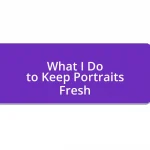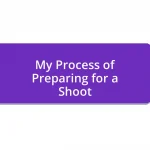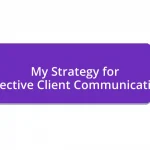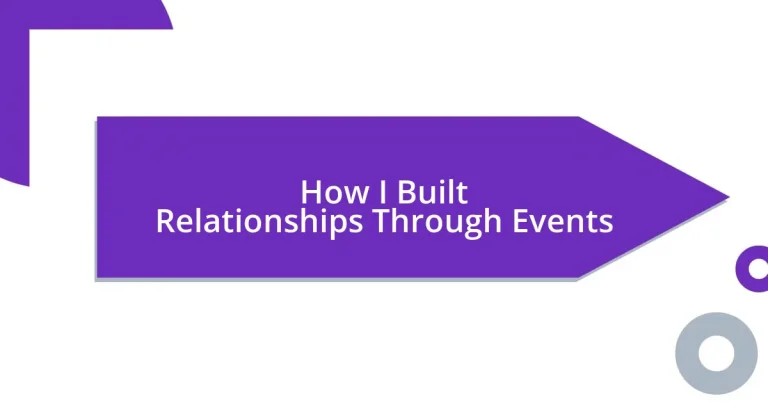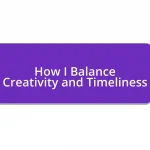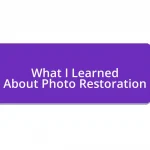Key takeaways:
- Events facilitate genuine connections through shared experiences and meaningful conversations.
- Preparation, including researching attendees and setting clear goals, enhances networking effectiveness.
- Engaging authentically through active listening, thoughtful questions, and personal stories deepens relationships.
- Following up promptly and showing continued interest solidifies connections and fosters long-term relationships.
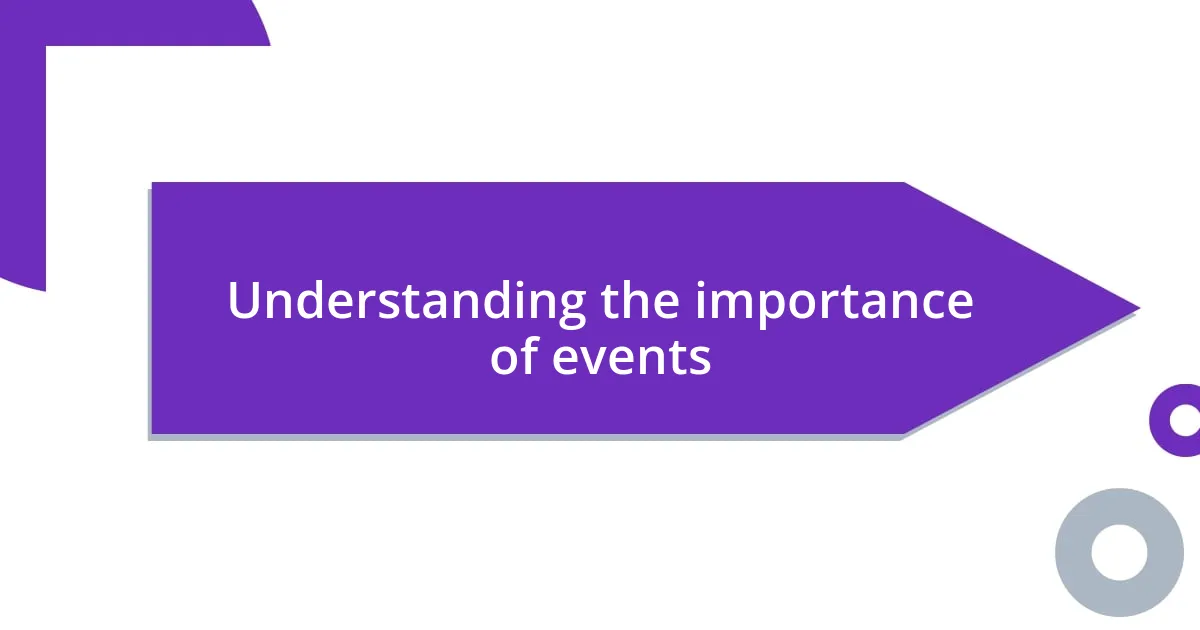
Understanding the importance of events
Events serve as powerful catalysts for building relationships, connecting people around shared interests and experiences. I remember attending a local networking meetup early in my career. The initial awkwardness quickly faded as genuine conversations flowed, creating bonds that felt both natural and meaningful.
These gatherings provide the perfect opportunity to break down barriers, allowing us to engage on a personal level. Have you ever noticed how a simple shared laugh can transform a stranger into a friend? I cherish those moments when I realize that we all share similar struggles, hopes, and dreams, fostering a sense of belonging that can often be hard to find elsewhere.
Moreover, events often create a shared memory that enhances the relationship over time. When I reflect on the events I’ve attended, it’s the moments of connection—like deep discussions over coffee or spontaneous group activities—that echo in my mind. Each interaction becomes a thread in the tapestry of my professional and personal life, reminding me of how crucial these experiences are in cultivating lasting relationships.
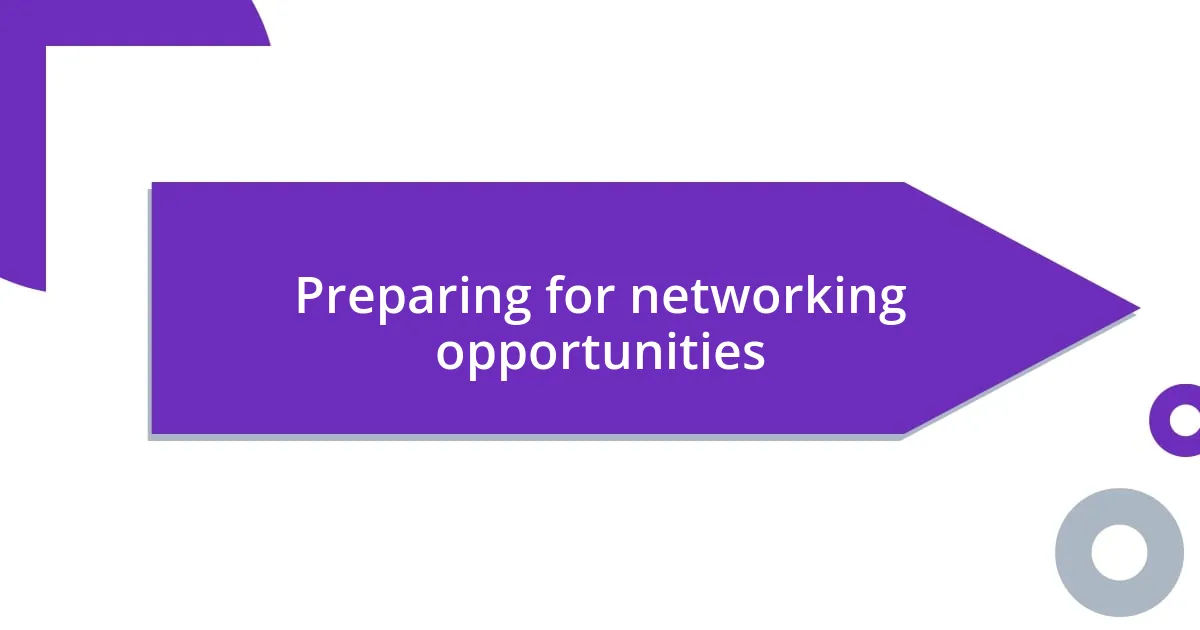
Preparing for networking opportunities
Preparing for networking opportunities involves a thoughtful approach to ensure you make the most of each encounter. I always find it valuable to research the event beforehand. Knowing who will be present and what topics are trending in those circles can help me craft genuine conversations. Recently, before attending a workshop, I looked up some attendees on LinkedIn and discovered shared interests with a few. That proactive step transformed meeting them into a much deeper and more engaging interaction.
Another important aspect is setting clear goals for what you hope to gain from the event. I’ve learned through experience that entering a room with specific objectives—like wanting to connect with three new people or seeking advice on a particular challenge—keeps me focused. Sorting out my intentions ahead of time allows for a less overwhelming experience. I remember one event where my goal was to gather input on my project. Not only did I gather diverse insights, but I also made lasting connections that were inspired by my openness.
Finally, don’t underestimate the power of being prepared with conversation starters. Having a few topics or questions in mind can ease those first awkward moments. During my last networking event, I brought up the latest industry trends, which sparked discussions that ultimately led to collaborative opportunities. By being prepared in this way, I felt confident and engaged, which reflects positively and makes others more likely to connect with me.
| Preparation Aspect | Description |
|---|---|
| Research | Understanding event attendees and topics to spark conversations. |
| Setting Goals | Establishing clear objectives for meaningful interactions. |
| Conversation Starters | Having topics ready helps ease initial conversations. |
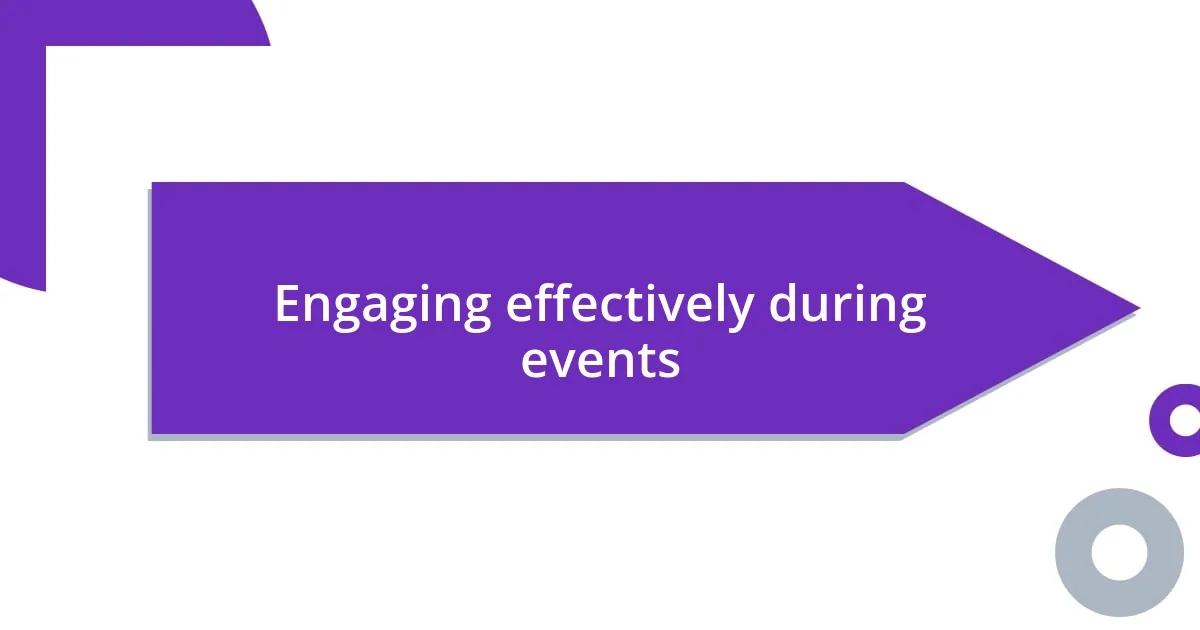
Engaging effectively during events
Engaging effectively during events requires an authentic approach that resonates with others. I remember a conference where I made it a point to attend a session outside my usual interests. It was there that I unexpectedly connected with an attendee who shared a similar passion for community service, sparking an hour-long discussion that illuminated our respective journeys. This experience taught me that stepping out of my comfort zone can lead to enriching conversations, ultimately fostering deeper connections.
Here are some insights that can enhance your engagement:
– Active Listening: Pay attention to what others are saying. Express genuine interest; it makes a difference.
– Ask Thoughtful Questions: Questions like “What inspired you to join this event?” invite deeper dialogue.
– Share Personal Stories: Relatable anecdotes can break down barriers and make conversations more meaningful.
– Be Present: Put away distractions. When you focus fully on the conversation, it creates a sense of connection.
– Follow-Up: After the event, reaching out to those you connected with reinforces the relationship and shows you value their time.
These strategies have guided my interactions, turning casual encounters into lasting friendships that enrich my personal and professional life.
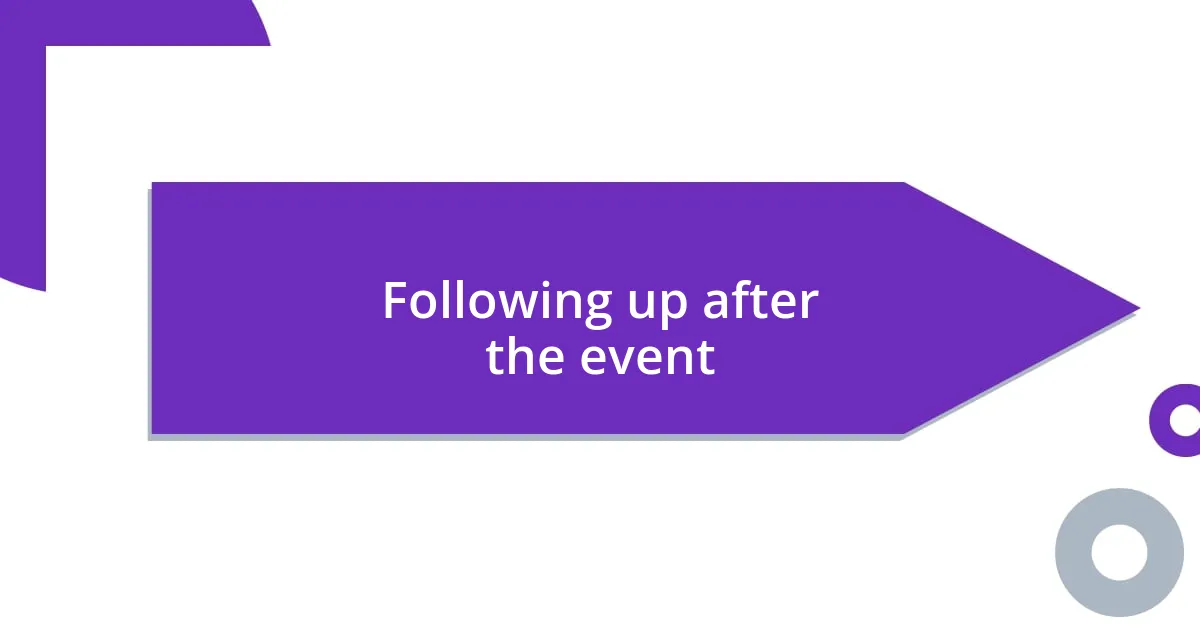
Following up after the event
Following up after an event is crucial for solidifying connections. I remember one instance where I met a fascinating individual who was working on a startup. After the event, instead of letting that initial spark fizzle out, I took a moment to send a personalized message referencing our conversation. It felt great to hear back from them, and I realized how a simple follow-up transformed a fleeting interaction into a potential collaboration.
I often find that timing is key. If I wait too long to follow up, the energy from the event can start to fade. That’s why I make it a habit to send an email or a message within a couple of days. I ask myself, “If I don’t reach out soon, will they still remember me?” This helps me stay committed to maintaining relationships. Plus, I always try to include a reminder of something we discussed, making it more personal and engaging.
Of course, showing genuine interest post-event can deepen these budding relationships. I’ve occasionally sent articles or resources related to topics we shared, just to keep the conversation going. It’s rewarding when someone tells me, “I’m so glad you sent that,” as it reinforces the idea that my efforts matter. Have you ever felt that rush when someone appreciates your thoughts? It’s those small gestures that can lead to lasting bonds in both personal and professional spheres.
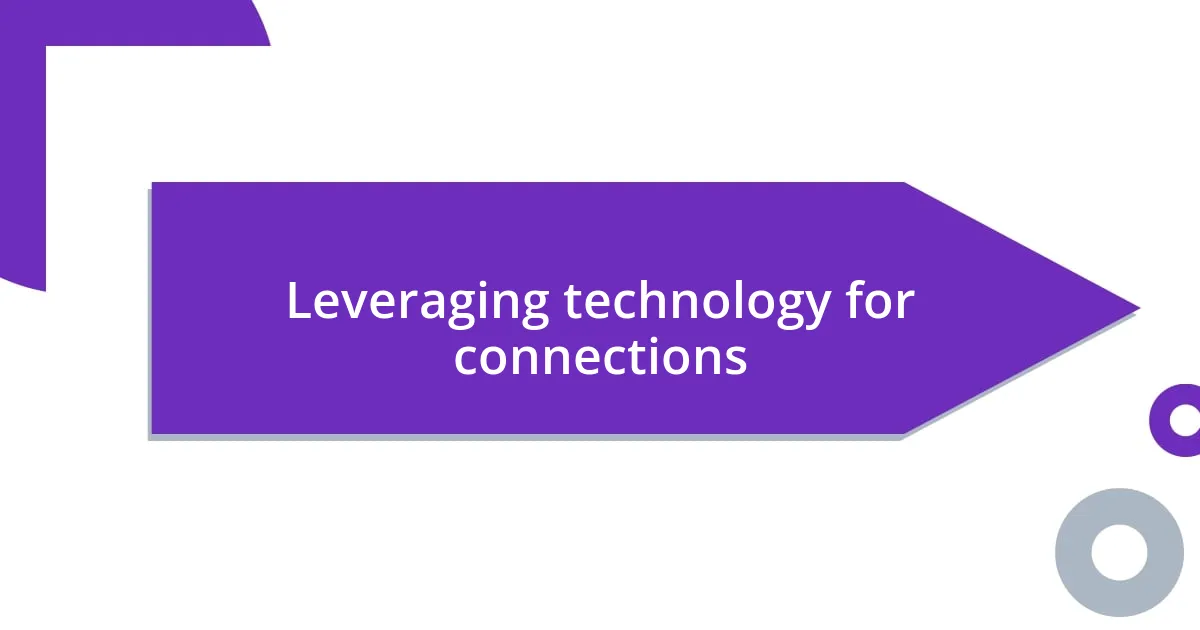
Leveraging technology for connections
Technology can be a powerful ally in building connections. I’ve found that using social media during and after events not only allows for real-time engagement but also boosts visibility. For example, tweeting insights or tagging new acquaintances in LinkedIn posts can spark conversations that extend well beyond the event. Often, I wonder, when was the last time that a single tweet led to a valuable discussion?
Utilizing event-specific apps has made my networking efforts more targeted and efficient. At one particular conference, I downloaded the event’s app, which featured options to connect with attendees and arrange meet-ups. I reached out to a few participants beforehand, setting the stage for a fruitful exchange. There’s something exhilarating about knowing that when you walk into a venue, you’ll have pre-arranged discussions waiting for you. It creates a sense of purpose; don’t you feel that anticipation when meeting someone you’ve only interacted with online?
Moreover, video calls post-event have become my go-to for nurturing relationships. I remember scheduling a virtual coffee with someone I met at a seminar; the casual format made it easy to dive deeper into our shared interests. This face-to-face connection—albeit through a screen—has allowed me to maintain a more personal touch. Do you ever feel that the warmth of a conversation can transcend even the most impersonal platforms? I certainly do, and it’s a reminder of how technology can enhance our human connections.
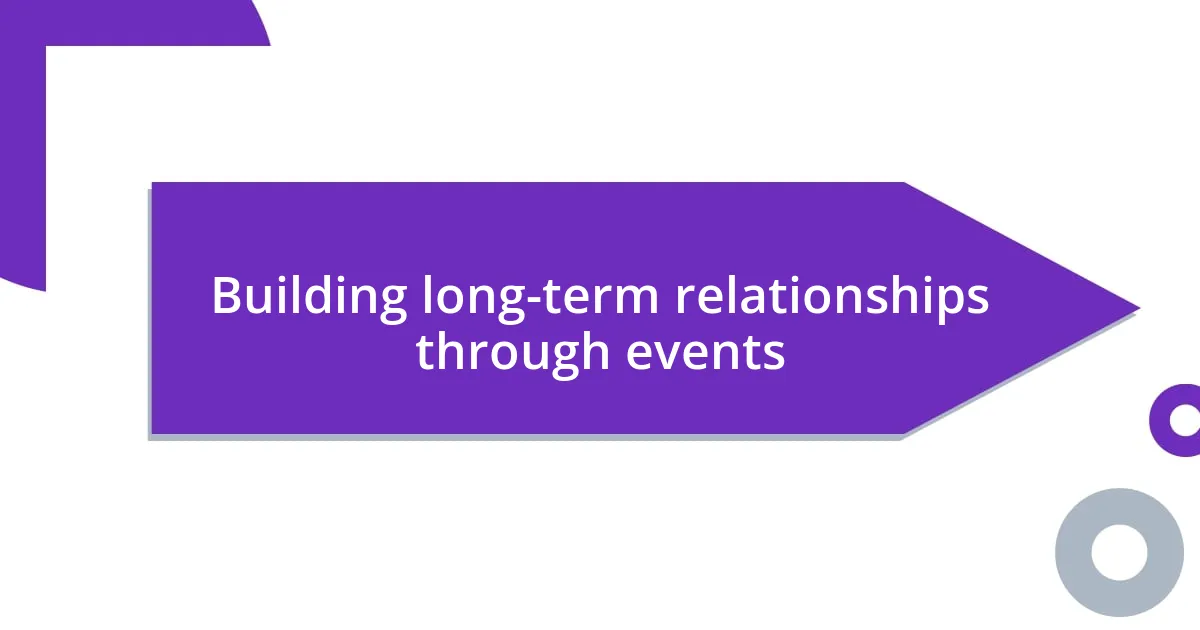
Building long-term relationships through events
Building long-term relationships through events isn’t just about shaking hands and exchanging business cards. I remember a networking dinner where I had the chance to bond with a fellow attendee over our shared admiration for a particular author. That night, we talked about everything from our favorite books to our long-term career goals. I sensed that genuine connection, which led to regular coffee meet-ups in the coming months. How often do we overlook the importance of these deep conversations amidst the hustle of networking events?
Engagement doesn’t end with the event; it thrives in the months that follow. In one instance, after a workshop, I felt inspired to share some insights with a group of participants via a group chat on a messaging app. To my surprise, those small discussions transformed into a supportive network where we encouraged one another on our respective journeys. It’s interesting to think, could a simple exchange of ideas kindle a long-lasting camaraderie?
I’ve also learned that memories can cement relationships. For birthdays or significant milestones, I make a point to send a small note or a digital card. I remember one year, I sent a simple congratulatory message after a colleague launched their new project. The warmth of their response was priceless. It made me realize that little gestures often leave the largest impact. Have you ever considered how a simple acknowledgment can reinforce a connection? I know from experience that it’s those reminders of care and affirmation that often turn acquaintances into true allies.





